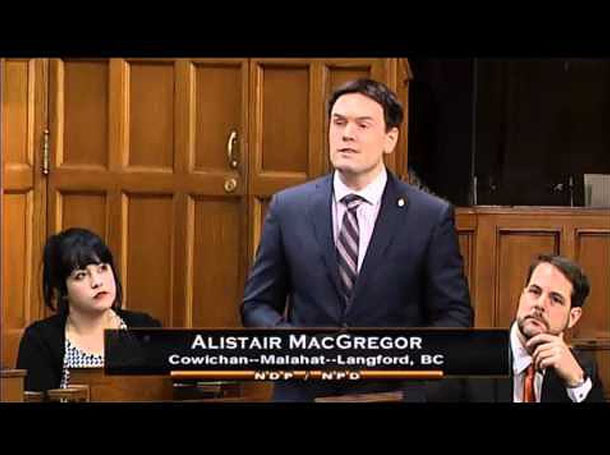A rookie MP from British Columbia tabled a bill Tuesday in the House of Commons aiming to limit the length of federal election campaigns.
What would be even better, said a government watchdog, is laws keeping politicians honest.
New Democrat Alistair MacGregor, who represents Cowichan-Malahat-Langford, told The Tyee last year's election cost Canadian taxpayers an estimated $150 million dollars more than the previous one in 2011 because it ran for twice as long.
"I think that is an outrageous amount of money to spend on a campaign when we really only need a reasonable length to make our decisions," MacGregor said.
The 2015 election campaign was 78 days long, the election in 2011 was less than half the length at 36 days.
Most elections in Canada since the late 1980s have been less than 40 days in length and the 2015 campaign was the second longest in history, according to government records.
The only one longer was in 1872 and was 89 days long from the writ drop to election day.
Draining
When the writ was dropped by the Conservatives last year many analysts said they decided upon an extra-long campaign in an attempt to drain the war chests of their less-moneyed opponents.
It was also suspected the Conservatives were trying to avoid an expected barrage of third-party attack ads throughout in the summer. Once the writ is dropped such ads are not permitted.
If MacGregor's bill passes election lengths will be capped at 46 days, which he said gives plenty of leeway for holidays or other impediments to elections.
But he said it will also take big money out of Canadian politics countering the Fair Elections Act the Conservatives passed in 2014, which allows parties to boost their election spending if a campaign passes 37 days.
It provides a chance for wealthy parties to severely outspend others, according to MacGregor.
"I think money distorts the ability of all people to have an equal voice in an election," he said. "I want to prevent us from sliding down a path to U.S.-style elections where only the large parties who have the very wealthy donor lists can compete."
He said the bill will not likely be debated in the House for at least two years.
Vote for honesty?
Duff Conacher of the government watchdog organization Democracy Watch said capping election limits is a sound idea, though the threat of another lengthy election is minimal and the Liberals have promised new campaign finance limits.
Conacher said parties may now also realize long election campaigns and the accompanying political ads are a waste of money.
"You can spend a bunch of money early on if you have it," he said. "But it just doesn't reach people because they're not paying attention."
But he said a campaign-length limit would be good to have on the books in case a government in the future does see an unfair benefit to holding a long election campaign.
Conacher said if the New Democrats really want to shake up Parliament they should introduce a bill legislating honesty in politics.
"If you want to get the other parties voting against something that would embarrass them it would be voting in favour of dishonesty during elections," he said. ![]()
Read more: Federal Politics















Tyee Commenting Guidelines
Comments that violate guidelines risk being deleted, and violations may result in a temporary or permanent user ban. Maintain the spirit of good conversation to stay in the discussion.
*Please note The Tyee is not a forum for spreading misinformation about COVID-19, denying its existence or minimizing its risk to public health.
Do:
Do not: